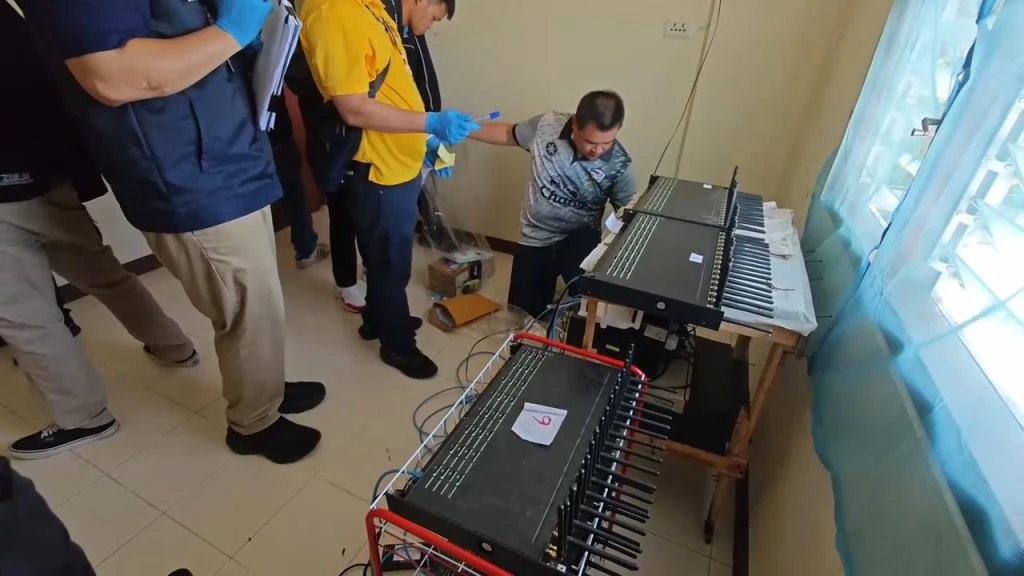Crime
Cyber Crime Scams Hit a Staggering US$1.6 Billion in Thailand

Thailand’s Chief of the Cyber Crime Investigation Bureau reports that over the last 18 months, more than 365,000 online scam cases have been submitted, with the total harm inflicted totaling to 45 billion baht (US$1.6 billion dollars).
Pol Lt Gen Worawat Watnakhonbancha was replying to the “thaipoliceonline.com” cumulative complaint data. The data, released by the Royal Thai Police (RTP), spans the period from March 1 of last year to September 30 of this year.
According to the data, consumers filed 365,547 scam-related complaints on the police website. They caused a total of 45.7 billion baht (US$1.693 billion) in harm and blocked 167,347 mule accounts worth 11.25 billion baht.
According to Pol Lt Gen Worawat, the majority of complaints involved online shopping fraud, with 100,694 cases generating 1.9 billion baht in damage.
Loan scams (33,517 cases), investment scams (22,740 cases), threatening scams by call centres (20,474 cases), impersonating others’ identities to encourage people to transfer money (9,664 cases), and duping victims into transferring money for a reward (8,697 cases) were also popular.
Online shopping fraud (8,107 incidents), duping victims into installing suspicious apps (4,786 cases), inserting phoney data into a computer system (2,972 cases), romance scams (2,167 cases), digital asset fraud (1,229 cases), and computer hacking (79 cases) were the next most common.
Pol Lt Gen Worawat cautioned people to be wary of scammers, who are increasingly employing more advanced ways to defraud victims. Despite the government’s advice to improve cybersecurity, many people continue to fall victim.
Pol Lt Gen Worawat advised people about bogus internet complaint websites that try to persuade complainants to click on questionable links. According to him, people can only make online complaints through the “thaipoliceonline.com” website.
For more information, individuals can call the “1441” hotline or “081-866-3000” in addition to the RTP website.
Meanwhile, Saruon Loem, a 41-year-old Cambodian, was apprehended by Sa Kaeo Provincial Police and Klong Luk Police on Thursday at the Rong Kluea border market in Aranyaprathet district of Sa Kaeo while attempting to smuggle 13.5 million baht into Cambodia.
According to police, he claimed he was hired by a fellow countryman named Mr Pia to receive and transport money from a Thai bank manager. He stated that he received a monthly salary of 10,000 baht.

Types of Online Scams in Thailand
Online scammers can be found in many countries, including Thailand, just as they can be found in other parts of the world. Scammers often use various tactics to deceive and defraud individuals, so it’s essential to be cautious when engaging in online activities, whether it’s shopping, socializing, or conducting business in Thailand or any other country. Here are some common online scams that have been reported in Thailand and some tips to avoid falling victim to them:
- Advance Fee Fraud: This type of scam typically involves a scammer promising you a large sum of money or valuable goods but asking for an upfront fee to release the funds or items. Be wary of any requests for advance payments or personal information from unknown sources.
- Phishing Scams: Scammers send emails or messages that appear to be from reputable organizations or government agencies, asking for personal information, passwords, or financial details. Always verify the sender’s legitimacy and avoid clicking on suspicious links.
- Online Shopping Scams: Some websites may offer products at extremely low prices to entice buyers. These websites might be selling counterfeit or non-existent goods. Only shop from reputable websites and be cautious of deals that seem too good to be true.
- Romance Scams: Scammers may create fake profiles on dating websites or social media platforms to form romantic relationships with victims. Eventually, they may request money for various reasons. Be cautious when sharing personal information or sending money to individuals you’ve never met in person.
- Investment and Ponzi Schemes: Scammers may promise high returns on investments or invite you to join a pyramid or Ponzi scheme. Always research investment opportunities thoroughly and consult with a financial advisor if necessary.
- Tech Support Scams: Scammers may call or send messages claiming to be from tech support companies, stating that your computer has a virus or problem. They will then ask for remote access to your device or payment for services. Legitimate tech support companies do not typically initiate contact this way.
- Lottery or Prize Scams: Scammers might inform you that you’ve won a lottery or prize and request payment or personal information to claim your winnings. Be skeptical of unsolicited messages about lottery or prize winnings.

To protect yourself from online scams in Thailand or any other location:
– Be cautious when sharing personal information online.
– Verify the legitimacy of websites, businesses, or individuals before conducting any transactions.
– Use strong, unique passwords for online accounts.
– Install and regularly update antivirus and anti-malware software on your devices.
– Educate yourself about common online scams and warning signs.
– Trust your instincts; if something seems too good to be true or feels suspicious, it probably is.
If you believe you have encountered an online scam in Thailand, or if you have been a victim of one, consider reporting it to the local authorities and your country’s embassy or consulate. Additionally, you can report the incident to relevant online platforms or consumer protection agencies.
Crime
Police Officer Being Ordained at Temple Arrested for Running Scam Call Center

Police in Northern Thailand have arrested a fellow officer as he was being ordained at a temple in Ngao district of neighbouring Lampang province.
Pol Lt Col Bandit Khonkan chief inspector from the Hang Dong police station was disrobed and taken to the Chang Puak station in Chiang Mai. He was arrested on charges of running a call centre scam gang in Chiang Mai Province.
According to Thai Media Chiang Mai Provincial Police Region 5 obtained an arrest warrant for Pol Lt Col Bandit on Friday from the Chiang Mai Provincial Court for procuring illegal telecom equipment, setting up a station and using public airwaves to run a telecommunications business without permission.
Pol Lt Col Bandit reportedly told investigators that he was not the ringleader and was only a member of the gang with Chinese partners.
His arrest followed the apprehension of his 26-year-old daughter, Miss Wanuchapond, 26, and three others during raids at three housing projects in Chiang Mai on Friday, Pol Maj Gen Weerachon Boontawee, deputy chief of Provincial Police Region 5 told Thai media.
During the raids police police discovered around 12 GSM gateways, or SIM boxes, which are devices used for converting cellular networks into mobile phone numbers used domestically.
The chief inspectors daughter Miss Wanuchapond told the arresting officers that she was paid 8,000 baht a month at each of the three locations for renting thr rooms and monitoring devices.

She claimed she had no idea what the devices were and accepted the job because the pay was attractive.
Police investigators working with telecom regulators used a special tracking device to monitor the gang’s communications and learned that its base was in Myanmar opposite Mae Sai district of Chiang Rai.
The call center gang used the GSM gateways to make calls over the internet to scam people in Thailand out of million of baht.
The GSM gateways transmitting signals via SIM boxes to convert them into domestic phone numbers, duping victims into thinking they were being called from Thai government agencies.
Pol Maj Gen Weerachon said that each SIM box held 32 SIM cards, with a capacity of up to 300,000 calls a month. The seized devices had made fraudulent calls over 3.6 million times.
He said the their investigation is ongoing and they are working to track down the remaining conspirators, including Chinese and other Thai suspects.
Authorities are still deciding whether Pol Lt Col Bandit will be dismissed from the force, he said, adding that so far, no other officers are known to have been involved.

Meanwhile, Prime Minister Settha Thavisin has authorized the establishment of an emergency cyber center operated by the Royal Thai Police to combat transnational crimes committed by call center gangs along the Thai border in Chiang Rai province.
On July 19, Prime Minister Settha Thavisin directed the Center to combat information technology crimes. The Royal Thai Police (Royal Thai Police) will crack down on call center gangs in Myanmar, Laos, and along the border.
His directive comes as call center gangs ratchet up their scams to defraud people of their money, causing concern among Thais and jeopardizing the country’s economic and social stability.
Related Police News:
Machete Wielding Man Shot an Killed by Police in Chiang Rai
https://www.chiangraitimes.com/chiangrai-news/machete-wielding-man-shot-an-killed-by-police-in-chiang-rai/
Crime
Thai Immigration Police Arrest Colombian Tourists Over Home Invasions

Immigration police officers have arrested four Colombian nationals in connection with a series of home burglaries at luxury housing complexes in the Bangkok metropolitan area and Chiang Buri Province.
Pol Maj Gen Panthana Nuchanart, deputy commissioner of the Immigration Bureau, told a press briefing that three of the suspects were apprehended in Nonthaburi Province and the fourth in South Pattaya, Chon Buri Province.
According to the Bangkok Post, the Colombians were charged with stealing conspiracy and seized around 3 million baht (US$82,500.00).
According to Pol Maj Gen Panthana, the criminals rode motorcycles through housing estates, scoping out the properties and waiting for the owners to depart before committing their crimes.
He stated that all four of the accused denied any involvement in the home break-ins, but the arresting squad discovered evidence that implicated them.
Police called to home invasion
Meanwhile, police were dispatched to a luxury housing development in Tambon Nong Prue, Chonburi Province, after a Chinese man was attacked during a house invasion.
When they arrived, they discovered the house owner, Mr. Qian Peng Yi, visibly scared and with marks from being tied up with a cable. He informed police that three Chinese males broke into his home at 9 p.m., one of whom brandished a gun at him and directed him to his bedroom.
They bound his hands and feet, gagged him with fabric, taped his head, and forced him into the bed. The intruders then attempted to compel him into transferring 10 million baht in cryptocurrencies to them, endangering the life of his 33-year-old cousin who was in a second-floor bedroom.
While they scoured the house in search of riches, Mr. Peng Yi managed to flee and hide; he subsequently observed them leave with his cousin. Officials investigated the property and analyzed security camera footage from the incident and surrounding areas.
Around 9 p.m., a 30-year-old van driver came at the Bang Lamung police station after being contacted by an agency to carry Chinese customers from Pattaya to Suvarnabhumi Airport.
The driver informed authorities that he was supposed to pick them up at a motel about a kilometer from the Chinese businessman’s home. He then drove them to Bangkok’s Suvarnabhumi airport, arriving at 1 a.m. and receiving 1,800 baht.
The driver took a snapshot of the group smoking at the airport gate and identified one of them as the victim’s cousin. Police suspected coordination between her and the three suspects in her cousin’s heist, who all departed Thailand on the same aircraft.
Other Bangkok News:
Police in Bangkok Discover Six Vietnamese Tourists Dead in 5 Star Hotel
Police in Bangkok Discover Six Vietnamese Tourists Dead in 5 Star Hotel
Crime
Son of Thailand’s Leading Legal Scholar on Corruption Arrested for Running Online Gambling Network

The son of a former senator and leading economist and expert on corruption and gambling in Thailand has been arrested for on charges of running an online gambling network and its payment system.
Police from Thailand’s Technology Crime Suppression Division (TCSD) have confiscated assets worth more than (US$ 11.1 million) 400 million baht.
Narote Piriyarangsan, 33, was arrested following crackdowns in three sites around the city, according to Pol Maj Gen Athip Pongsiwapai, commander of the police Technology Crime Suppression Division (TCSD).
Mr Narote’s father, Sangsit Piriyarangsan, is an economist who has written articles and books about corruption and gambling. He was one of the appointed senators that were investigating the government’s intention to legalize casino gaming before their terms expired.
Police also detained 39-year-old Narayut Narakaew, the owner of the gambling website 69pgslot.com. The Criminal Court issued arrest warrants for the couple for operating an internet gambling service and money laundering.
According to the Bangkok Post, police seized two desktop computers, one laptop computer, 14 mobile phones, 21 bank passbooks, 53 ATM cards, and four high-end cars — a Ferrari 926 GTS, an Aston Martin, a Lexus, and a Subaru — totaling more than 400 million baht.
Police launched the inquiry after discovering the online gambling site, which accepted funds via an automatic deposit-withdrawal system through bank accounts and deposits in the AskMePay system. Players scanned the VPay QR code as well as the QR codes for Heng Online 888 or Heng Pay Company.
Police also discovered that payments received via QR code scans were transferred to the account of Heng Pay Co and then to the gambling website’s mule accounts using AskMePay, which did not use banks’ face recognition scanning. An inquiry indicated a monthly turnover of approximately 5 billion baht.
According to investigators, the website has been up and running for around four years, with the payment mechanism in use for roughly eight months.
According to Pol Maj Gen Athip, Mr Narote owns the gaming website’s payment systems and is the director of Heng Pay Co. After gathering evidence, authorities requested arrest warrants for 14 people.
Thailand does not allow almost any kind of gaming. Even though the law doesn’t say anything specific about online gaming, it is still considered gambling. The country has pretty strict rules about gambling. Thai punters can bet on the national lottery and horse races, but they can’t bet on any other types of games.
But it’s not a secret that there is a huge illegal gaming business in Thailand, even though it’s illegal.
The illegal casinos, online betting shops, underground lotteries, and pop-up bookies that take bets on everything from cockfights to Muay Thai make a shadow economy that is worth billions of dollars every year.
Related News:
Thailand’s Cyber Crime Police Raid Top Cops Home Over Gambling Websites
Thailand’s Cyber Crime Police Raid Top Cops Home Over Gambling Websites
-

 News3 years ago
News3 years agoLet’s Know About Ultra High Net Worth Individual
-
Entertainment2 years ago
Mabelle Prior: The Voice of Hope, Resilience, and Diversity Inspiring Generations
-

 Health3 years ago
Health3 years agoHow Much Ivermectin Should You Take?
-

 Tech2 years ago
Tech2 years agoTop Forex Brokers of 2023: Reviews and Analysis for Successful Trading
-

 Lifestyles2 years ago
Lifestyles2 years agoAries Soulmate Signs
-

 Movies2 years ago
Movies2 years agoWhat Should I Do If Disney Plus Keeps Logging Me Out of TV?
-

 Health3 years ago
Health3 years agoCan I Buy Ivermectin Without A Prescription in the USA?
-

 Learning2 years ago
Learning2 years agoVirtual Numbers: What Are They For?
